

The ongoing global economic crisis has had a far-reaching impact, affecting individuals globally in different ways. Russia’s invasion of Ukraine has impacted many critical aspects of our lives from upending global supply chains, to impacting global food security and, limiting access to essential commodities such as palladium, which is used in industries including transportation, electronics, manufacturing, and construction. The stability of the United States economy is contingent upon the prosperity of other nations.
Global development plays a role in helping building this stability. America’s leadership on the global stage in fostering development by providing aid not only stimulates global economic growth but also reduces poverty, increases education opportunities, expands access to healthcare, and strengthens trade relationships. Events taking place far from our shores, like the invasion in Ukraine, can have long-term consequences for the United States economy and it is through development programs and assistance that we can help promote global stability.
In recognition of Black History Month, it is important to highlight African American economists who have shown the crucial nature of economic stability and the influence and importance of America’s global economic leadership.
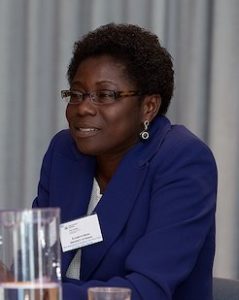 As a Ghanaian-American economist who serves at the University of Kansas, Dr. Elizabeth Asiedu is a leading voice on foreign assistance and its impacts on economic growth and development in Africa. Through her research, Asiedu has explored the impact of institutions and governance on the effectiveness of international development assistance.
As a Ghanaian-American economist who serves at the University of Kansas, Dr. Elizabeth Asiedu is a leading voice on foreign assistance and its impacts on economic growth and development in Africa. Through her research, Asiedu has explored the impact of institutions and governance on the effectiveness of international development assistance.
As a respected academic, Asiedu has published numerous books and papers on foreign assistance, including the highly acclaimed “Does Foreign Aid In Education Promote Economic Growth? Evidence From Sub-Saharan Africa”, where she critically assesses the impact of development funding on Africa’s economic growth and development from a variety of perspectives. Her expertise has been sought after by international organizations such as the World Bank, where she has provided technical assistance and advised on issues related to global development, including the impact on primary education in Africa. Elizabeth Asiedu is a leading voice in the discourse on foreign aid and its impact on economic growth and development in Africa.
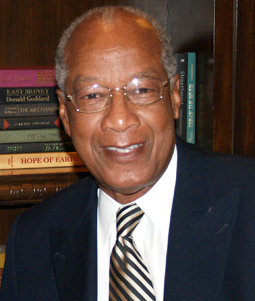 Dr. Green is a renowned expert in the fields of poverty and income inequality in developing nations. He has placed emphasis on utilizing data and evidence in evaluating the efficacy of aid and developing evidence-based policies and programs to increase educational opportunities. He has emphasized the importance of providing education to everyone regardless of their income or socioeconomic status.
Dr. Green is a renowned expert in the fields of poverty and income inequality in developing nations. He has placed emphasis on utilizing data and evidence in evaluating the efficacy of aid and developing evidence-based policies and programs to increase educational opportunities. He has emphasized the importance of providing education to everyone regardless of their income or socioeconomic status.
Alongside Dr. Martin Luther King Jr. and other civil rights activists, Dr. Green has made significant contributions to education access for low-income communities, especially those within black communities. While his actions to enhance educational access have mainly focused more on domestic policy here at home, he has also spoken about the impact that global development funding can have on areas like education access that will impact employment opportunities and a country’s economic growth. He has written about the positive impact that economic stability will have if more children are provided with the opportunity to attend school.
Dr. Green’s dedication to these efforts has been recognized through the receipt of the International Gandhi, King, Ikeda Award for Human Rights and Peace Initiatives from Morehouse College. Dr. Green has played a pivotal role in shaping the policy discourse surrounding poverty reduction and the interconnections between national and international development initiatives.
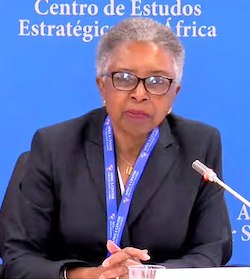 Dr. Willene A. Johnson served as a vice president of the Federal Reserve Bank of New York and president of the National Economic Association. Throughout her work, she has, and continues to emphasizes the critical role of development assistance in promoting economic development and enhancing governance capacity in African countries.
Dr. Willene A. Johnson served as a vice president of the Federal Reserve Bank of New York and president of the National Economic Association. Throughout her work, she has, and continues to emphasizes the critical role of development assistance in promoting economic development and enhancing governance capacity in African countries.
With over two decades of experience in the field, Dr. Johnson brings a wealth of knowledge and expertise to her advocacy for the importance of continued efforts to support global development in African economies through foreign assistance to create growth and stability.
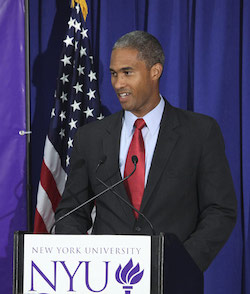 As an economist, Dr. Peter Blair Henry has made significant contributions to international development in developing countries. He has published research on the drivers of economic growth in emerging markets, policy on foreign investment, and the disparities in standard of living across the globe.
As an economist, Dr. Peter Blair Henry has made significant contributions to international development in developing countries. He has published research on the drivers of economic growth in emerging markets, policy on foreign investment, and the disparities in standard of living across the globe.
His recent work focuses on the intersection of developing-country economies and the need for greater assistance for infrastructure investment. Dr. Henry’s research highlights the infrastructure investment gap in developing countries and the impact this has on access to basic resources like electricity and water. In a recent paper, Dr. Henry provides a framework that demonstrates the necessity of foreign assistance and the potential benefits it brings, including improved infrastructure investment efficiency and financing opportunities through both development and private investments.
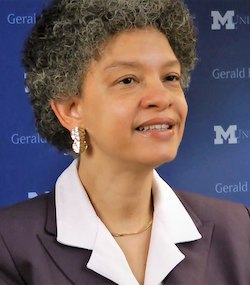 As a distinguished economist, Dr. Susan Collins previously held the position of President and CEO of the Federal Reserve Bank of Boston, making history as the first African American woman to lead a Federal Reserve Bank. Through her extensive research on economic growth in industrial, emerging, and developing countries, she has established the crucial role of American investment in promoting economic development, particularly in the trade economy.
As a distinguished economist, Dr. Susan Collins previously held the position of President and CEO of the Federal Reserve Bank of Boston, making history as the first African American woman to lead a Federal Reserve Bank. Through her extensive research on economic growth in industrial, emerging, and developing countries, she has established the crucial role of American investment in promoting economic development, particularly in the trade economy.
Dr. Collins’ studies emphasize the significant impact of trade and economic growth on relationships between nations, particularly in the context of developing countries. Her work speakes the importance of global development priorities such as growth and stability through employment and education that improve capital growth in a given country. Additionally, Collins has also written on how U.S. bilateral assistance supports U.S. foreign policy goals like preventing terrorism, preserving free trade, and providing humanitarian assistance.
Notifications